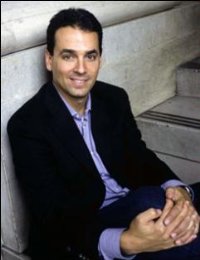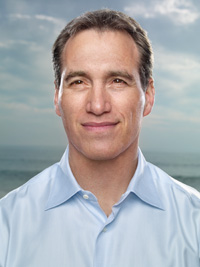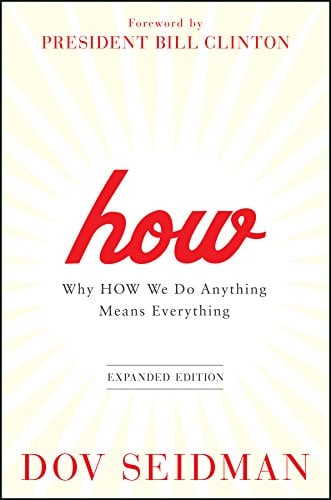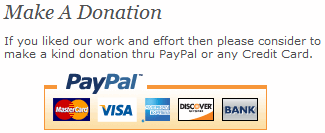How: Why How We Do Anything Means Everything / Dov Seidman, President Bill Clinton,
| List Price: | |
Our Price: $17 | |
|
For Bulk orders
| |
|
Used Book Price: | |
| How: Why How We Do Anything Means Everything / Dov Seidman, President Bill Clinton, | |
| Publisher: Wiley | |
| Availability: | |
| Sales Rank: 87845 | |
|
Similar Books
Guest Review: Daniel H. Pink on How
 |
Daniel H. Pink is the author of the New York Times bestsellers "Drive" and "A Whole New Mind." His books have been translated into 32 languages.
Something's gone wrong.
Our economy has stalled in ways that defy historic precedent. Institutions we once revered we now distrust. Consumers have lost confidence in their prospects as deeply as citizens have lost faith in our politics.
What happened?
In this remarkable book, Dov Seidman offers one of the most compelling answers I've encountered. Our challenges may seem like end-of-life crises, he says. But "they are really way-of-life crises caused by the nature of the relationships that connect us to our fellow human beings and our planet." In other words, the sense of disarray we feel emerges less from our circumstances than from character. For too long we've allowed "situational values" to trump "sustainable values" – and now we're contending with the aftermath.
The good news is that Seidman, who has applied his philosophy from the executive suite to the factory floor for almost 20 years, offers a path out of the morass. Recalibrating society’s rewards and punishments or tightening its laws and regulations isn't enough. We must return to principle as the foundation of our behavior. "In the twenty-first century," he writes, "principled behavior is the surest path to success and significance in business and life."
One of the many things I like about HOW is that Seidman writes with the sagacity of a philosopher, the acuity of a lawyer, and the practicality of a CEO. (No surprise there. He happens to be all three. He even calls himself "a moral philosopher in a suit.")
In particular, he makes a persuasive case for the comparative advantage of principled behavior.
In a world where competitors can swiftly match your price and mimic your processes, the one remaining source of differentiation is how executives and employees behave. Taking the low road might have been an option in the past. But today -- when technology leaves us morally interconnected and private behavior quickly enters the public record -- the high road is, by far, the better course.
The new, expanded version of Seidman's classic could not arrive at a more opportune moment. Haven't you grown weary of being told that "greed is good" and that some companies are "too big to fail"? Wouldn't it be wonderful to begin hearing that "principle is good" and that some companies "are too sustainable to fail"? That day can arrive – sooner than we suspect -- if all of us rethink our own behavior and heed the wisdom of HOW.
Q&A with the Author
 |
Why is your HOW message today more timely than ever?
All progress now depends on How. We have entered the Era of Behavior. Of course our behavior has always mattered, but in today’s world, it matters more than ever and in ways it never has before. We live in a more connected and interdependent world. Yet we tend to speak about the world in amoral terms. The single most profound implication of an increasingly interconnected world is that it has rendered us ethically, if not morally, interdependent.
How can HOW help us repair our faltering global economy?
Only by getting our "hows" right can we ensure that we are sustainable. This can only be achieved when we are rooted in, and inspired by, sustainable values. The global economic meltdown supplied a perfect, but painful, example of how sustainability cannot be guided by situational values. The economic crash occurred because too many financial companies became disconnected from fundamental values and long-term sustainable thinking. Instead of nurturing sustainable collaborations, banks, lenders, borrowers and shareholders pursued short-term relationships founded on situational values. More than ever we need to get out of this cycle of crises and build long-term success and deep human connections so that we achieve enduring significance in today's globally interconnected world.
What events in the news right now make your message all the more urgent?
The news is frequently dominated by social, political, corporate and environmental crises. In a hyperconnected and interdependent world, local problems quickly metastasize into global ones. The rapid pace and global scale of our problems can make us feel that we're facing existential doom every other day. Whether its global economic turmoil, the BP oil spill, the breakdown of culture at once-respected companies or the recent riots in London, these crises are all caused by human behavior and they can only be solved by changing our behavior. Take the situation currently in Europe where Germany is lending money to Greece for a bailout. It's not just about economics. It's about values. Germany is bailing out Greece on the condition that they behave more responsibly in future and get their Hows right.
So what exactly is HOW?
For many, business and life has always been about the pursuit of What: “What do we do? What’s on the agenda? What do we need to accomplish?” Whats are commodities; they are easily duplicated or reverse-engineered and delivered faster and at a lower cost by someone else.
How is a philosophy. It's a way of thinking about individual and organizational behavior. And How we do what we do – our behavior – has become today’s greatest source of our advantage. In this world, How is no longer a question, but the answer to what ails us as people, institutions, companies, nations. How we behave, how we consume, how we build trust in our relationships and how we relate to others provides us with the power to not just survive, but thrive and endure.
Can you elaborate further on The HOW Report that your company LRN is publishing in the fall?
The results of The How Report, our study of over 5,000 employees working for larger organizations based in the U.S, will have significant implications for CEOs and other business leaders. HOW metrics will provide strong and compelling evidence that the right culture, governance and leadership system can drive sustainable performance and success. The HOW Report demonstrates the correlation between principles and profits in action. We have turned issues like self-governance, values and trust that were once considered "soft" into the hard currency of business.
What's different about the new edition of this book?
John Wiley and Sons decided to republish an expanded edition of HOW based on their belief that the ideas in it are more resonant and relevant than ever and that it intersects with the zeitgeist even more than it did in 2007. I have written a new Preface for this new edition of the book where I attempt to capture all that has occurred on the HOW journey since its original publication and to apply HOW more broadly to the events and dynamics of today’s post-crisis world. In addition, I'm honored that President Bill Clinton contributed a Foreword in which he describes his own journey in being in the "HOW business for the rest of my life."
Now you can buy Books online in USA,UK, India and more than 100 countries.
*Terms and Conditions apply
Disclaimer: All product data on this page belongs to
 .
.No guarantees are made as to accuracy of prices and information.










